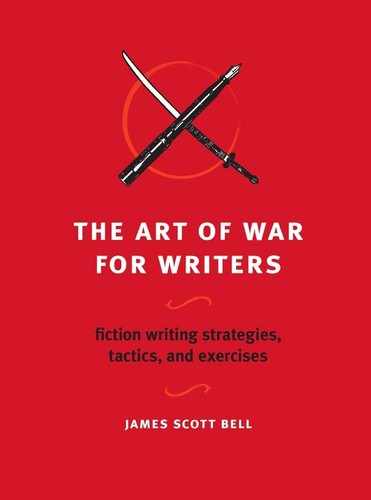
107
33
A premise must be
supported by fresh,
solid scenes.
Scenes are the building blocks of fi ction. A great premise
will not stand without solid scenes to prop it up. Color-
ful characters can fl it across the page, but unless they are
engaged in pitched battle, the reader won’t care.
Don’t let your scenes fall into cliché or monotony.
Always look for ways to freshen them up. Here are fi ve
techniques to help you do that.
1. make your dialogue fl ow.
Try writing a scene only in dialogue. Let it fl ow. Don’t
think much about it. When you’re fi nished, you can look
back and fi gure out what the scene is really about.
I once wrote a scene between competing lawyers. Part
of it went like this:
“You think you can get away with that?”
“Whatever works.”
“Disbarment works, too.”
“You want to try to prove that? Know what
that’ll make you look like?”
Z4273i_100-126.indd 107Z4273i_100-126.indd 107 9/24/09 11:21:00 AM9/24/09 11:21:00 AM

108
“Don’t presume to know what I will or will
not do.”
“I know you better than your wife, Phil.”
That last line of dialogue came out of nowhere. Why
did the character say that? I could edit it out, of course, but
it seemed far better to explore the implications. What that
led to was a plot point where the one lawyer reveals he’s had
an investigator on Phil for six months. And has pictures and
places and dates Phil will not want revealed to his wife.
All that just from playing with dialogue. Try it, and
you’ll discover undercurrents for your scene you didn’t
know were there.
2. cut or hide exposition.
Any time the author gives information in narrative
form, the immediate story is put on hold. This expo-
sition, if you don’t watch it, can bloat and choke off a
good scene.
The fi rst thing to look for is exposition you don’t
need. If it’s not crucial for the moment, delay it. If it’s not
crucial for the overall story, cut it. The more important
information can often be “hidden” by putting it into ei-
ther dialogue or a character’s thoughts.
Here’s an example of clunky exposition:
Cosmo was a successful doctor, but he had
a dark secret. Early in his career he took out a
Z4273i_100-126.indd 108Z4273i_100-126.indd 108 9/24/09 11:21:00 AM9/24/09 11:21:00 AM

109
patient’s liver, thinking it was an appendix. This
caused him to turn heavily to drink, but he never
let his colleagues or patients catch him at it. For all
anyone knew, he was a pillar of the community.
Pretty dull. But what if Cosmo is sitting at his desk
when his ex-wife bursts in holding a court order for more
spousal support?
Cosmo looked up from his medical reports.
“Mildred!”
“Court order,” Millie said, throwing an omi-
nous looking document in front of him.
“You can’t just barge in like this! I have pa-
tients to see.”
Millie laughed. “Don’t play honorable doctor
with me. I’m the one who had to pick you up at the
local bars all those years. Still hiding the whiskey
in your cotton jar?”
Cosmo cast a quick glance at the jar by the
window, then turned back to his former spouse.
“So what, are you going to try to smear me now?”
“If I wanted to smear you, I would have told
the papers a long time ago about Mr. Santini and
the young doctor who took out his liver.”
“You’re still holding that over my head?”
“How could anyone, let alone a doctor on the
staff of a major hospital, mistake a liver for an
appendix?” Millie shook her head.
Z4273i_100-126.indd 109Z4273i_100-126.indd 109 9/24/09 11:21:00 AM9/24/09 11:21:00 AM

110
“I’d like to mistake you for a cadaver!” Cosmo
said. “I will not have my good name in this com-
munity besmirched by you!”
“See you in court.” Millie turned and walked
out of the room. Cosmo took a deep breath, then
went to the cotton jar, opened it, and pulled out
a bottle of Jack.
You get the idea. When in doubt, have two charac-
ters argue about something, and put some exposition
in the argument. It works every time. Elmore Leonard
once said, “All the information you need in a book can
be put in dialogue.”
Thoughts are another way to do this. Here’s one from
Millie’s POV:
Millie shook her head. He was so pathetic.
Probably still on the juice, still trying to drown
out the fact that he took out a liver during an ap-
pendectomy.
3. fl ip the obvious.
Our minds work by reaching for the most familiar choic-
es available. For writers, that usually means a cliché. So
learn to fl ip things.
If your characters are mere types, your scenes won’t
engage the readers.
Z4273i_100-126.indd 110Z4273i_100-126.indd 110 9/24/09 11:21:01 AM9/24/09 11:21:01 AM

111
Imagine a truck driver rumbling down the highway
at midnight, holding the steering wheel in one hand
and a cup of hot, black coffee in the other.
Got that?
Now, I’ll bet the fi rst image your mind provided
was of a burly male, probably wearing a baseball cap or
cowboy hat. That’s a familiar image of a trucker. It’s a
cliché, and therefore not very interesting.
But what if you flipped it around? What if the
trucker was a woman?
Try it.
Now you have an image to play with. But I’ll wager
you still pictured a rather “tough” woman, because all
truckers are tough, right?
Flip that around. Put this woman in a nice eve-
ning dress. What does that do for your image? Why
is she dressed that way? Where is she going? Who is
after her?
You can play this game with descriptions and even
dialogue. For instance:
“It’s about time we started the meeting,”
Johnson said. “Let’s do an agenda check.”
“Right,” Smith said. “First item is the Nor-
wood project. Second, the P&L statement. Third,
employee benefi ts.”
Stop a moment and fl ip the obvious response:
Z4273i_100-126.indd 111Z4273i_100-126.indd 111 9/24/09 11:21:01 AM9/24/09 11:21:01 AM
..................Content has been hidden....................
You can't read the all page of ebook, please click here login for view all page.
